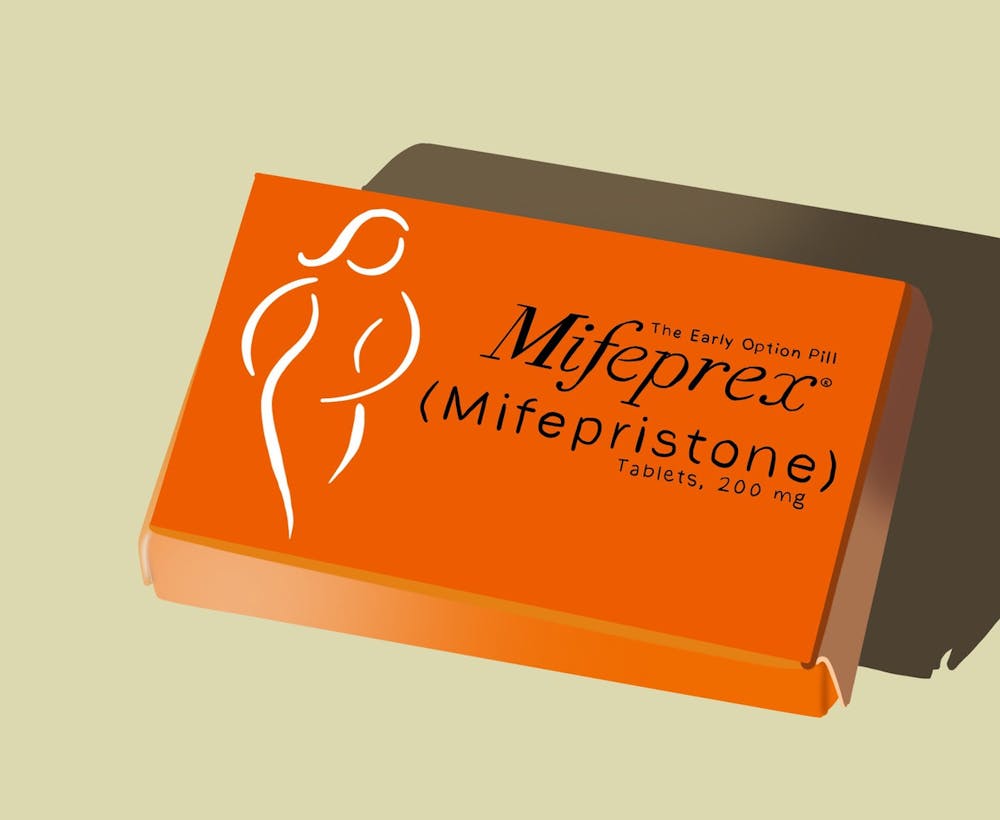On Jan. 3, the Food and Drug Administration announced that certified retail pharmacies can distribute mifepristone pills with a prescription. Combined with misoprostol, mifepristone can induce an abortion.
The decision provides patients increased access to medication abortions through their providers, according to Mindy Sobota, an associate professor of medicine and primary care physician.
What is mifepristone?
Mifepristone is the first in a two-drug regimen for a medication abortion, Sobota said. In contrast to a surgical abortion, which is exclusively performed in clinics and can be more invasive, medication abortions consist of prescription drugs taken to terminate a pregnancy, according to Sobota.
Mifepristone inhibits the production of hormones necessary for pregnancy while the second drug, misoprostol — a medication already distributed at retail pharmacies with a prescription — initiates contractions to expel the uterine lining, according to Sobota.
Data from 2020 showed that over half of the abortions administered in the U.S. were medication abortions. Demand for the drugs has increased since the Supreme Court’s Dobbs v. Jackson Women’s Health Organization decision, which overturned Roe v. Wade.
The FDA first approved the drug for use in medication abortions in 2000, but restricted distribution to patients at in-person clinics. In 2021, the FDA approved the drug’s distribution through registered mail-order pharmacies, before it approved its distribution at retail pharmacies this year.
Patients should expect no symptoms from mifepristone, Sobota said. After taking misoprostol 24 to 48 hours later, patients will experience cramping and bleeding as the pregnancy is ended.
24 hours after taking misoprostol, Sobota added, “you should feel more or less like your normal self.”
What does mifepristone’s approval mean for abortion access?
Sobota said that the FDA’s decision is a “game-changer for primary care physicians.” Before the authorization, primary care providers often did not prescribe mifepristone because it could not be filled by a retail pharmacy like CVS or Walgreens. Instead, the drug either needed to be stocked and dispensed from a clinic or, as of 2021, mail-ordered to a specialty pharmacy approved for remote distribution, Sobota said.
With the expanded number of physicians able to prescribe mifepristone, Sobota said she wants “healthcare workers to know that (medication abortions) really deserve to be in primary care.”
She added that medication abortions, which can take place at home, provide patients with “more privacy” than a procedure abortion.
Will mifepristone be available at Brown?
Retail pharmacies must apply for certification to distribute mifepristone, according to the FDA’s announcement. Two of the nation’s largest retail pharmacy chains, CVS and Walgreens, have expressed their intent to apply for certification to sell the pill.
CVS “plan(s) to seek certification to fill mifepristone prescriptions written by authorized providers,” spokesperson Amy Thibaut wrote in an email to The Herald.
In response to the FDA’s authorization, some states that limit abortion access have introduced or passed legislation to ban mifepristone use, prompting lawsuits that could set a precedent for medication abortion regulations.
According to Thibaut, CVS will fill prescriptions “where legally permissible” and pledged to “follow all FDA safety protocols regarding the medication,” but did not specify which states mifepristone may be distributed in.
Brown’s on-campus pharmacy has not specified whether they will apply to obtain certification from the FDA to fill mifepristone prescriptions, wrote Tanya Sullivan, assistant clinical director of Brown Health Services, in an email to The Herald. However, Health Services already distributes misoprostol. Sullivan added that students should refer to BWell’s abortion resources for more information.
Sullivan reaffirmed Brown Health Services’ commitment to providing reproductive health care to students. The department provides “inclusive and non-judgmental” options and referrals for abortions, including transportation, follow-up care and “comprehensive contraceptive care,” as well as counseling services, Sullivan said.
Sobota said she hopes that the FDA’s mifepristone authorization will encourage patients to discuss prospective abortion care with their primary care doctors at annual visits. Sullivan added that the University will “continue to support a full range of reproductive health services which we believe is vital for the safety and well-being of all members of our community.”

Owen Dahlkamp is the managing editor of newsroom on The Herald's 135th Editorial Board, overseeing the paper's news operations. Hailing from San Diego, CA, he is concentrating in Political Science and Cognitive Neuroscience with an interest in data analytics. In his free time, you can find him making spreadsheets at Coffee Exchange.





